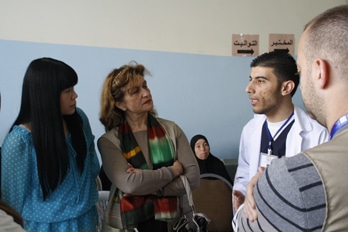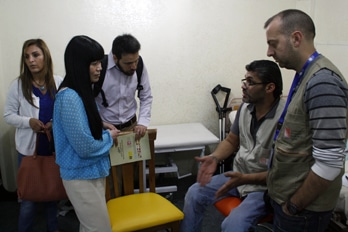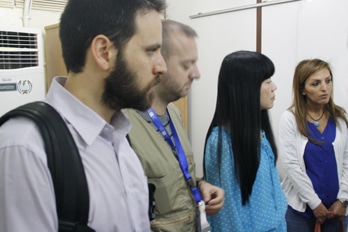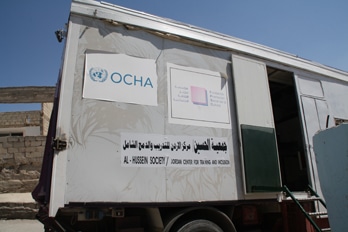 Last Tuesday, May 12, Shoko Arakaki, Section Manager and Juan Chaves-Gonzalez, the Person In charge of Humanitarian Issues from the OCHA Section of Finance Coordination in New York, together with OCHA´s staff in Jordan, visited the activities which were accomplished by FPSC and AHS in Ramtha to improve the condition of the Syrian refugees with disabilities and vulnerable Jordanians. The project, developed in Karak and Maán, has been financed by ERF Fund from OCHA.
Last Tuesday, May 12, Shoko Arakaki, Section Manager and Juan Chaves-Gonzalez, the Person In charge of Humanitarian Issues from the OCHA Section of Finance Coordination in New York, together with OCHA´s staff in Jordan, visited the activities which were accomplished by FPSC and AHS in Ramtha to improve the condition of the Syrian refugees with disabilities and vulnerable Jordanians. The project, developed in Karak and Maán, has been financed by ERF Fund from OCHA.
The delegation knew firsthand the clinic where aid was provided, among others to two beneficiaries of the project:
 Raneem:a young Syrian girl and her dream
Raneem:a young Syrian girl and her dream
Raneem Ahmad Yaseen is a 14 years old girl who was born with “spina bifida”. She came to Jordan with her family from Syria. Raneem has many dreams like any girl her age; however she stays at home all day helping her mother in some simple domestic tasks, though she wishes her help may be greater in the future.
Raneem has one only wish: to sleep alone in comfort on a bed. Since her arrival in Jordan, she has been sleeping on the floor, and obviously she had suffered severe backache pain and in her feet too due to her malformation. Raneem’s wish was to have a new bed which would allow her to sit and to work freely without any assistance or help.

After a first assessment done in the Takaful Health Centre in Ramtha (close to the Syrian-Jordanian border), the FPSC technical team, including a physiotherapist and occupational therapist, concluded that the best solution for Raneem’s case was a medical bed. It was considered the only way to make her dream come true. After the team provided her with a medical bed and a medical mattress, Raneem said: “I am happy now, I think this night will be the first night in my life I can sleep comfortably, and I’m sure this will boost my confidence”.
In addition, Raneem received a wheelchair that is suitable for her case, in order to help her to move and sit for a long time. Her mother said “With the help of OCHA, FPSC and their technical team, her life style has changed; now she is able to sleep like all people her age and to move alone. Thanks to these organizations, she is now facing fewer complications in her life and she has begun to live normally”.
Raneem and her family are very grateful to this project for their psychological and material aid, in particular for the distribution of tailored mobility aids. She said “Thank you, you made my dream come true”.

Mohammad Khairibarhim Al Monjed
Normal
0
21
false
false
false
ES
X-NONE
AR-SA
/* Style Definitions */
table.MsoNormalTable
{mso-style-name:”Tabla normal”;
mso-tstyle-rowband-size:0;
mso-tstyle-colband-size:0;
mso-style-noshow:yes;
mso-style-priority:99;
mso-style-qformat:yes;
mso-style-parent:””;
mso-padding-alt:0cm 5.4pt 0cm 5.4pt;
mso-para-margin:0cm;
mso-para-margin-bottom:.0001pt;
mso-pagination:widow-orphan;
font-size:11.0pt;
font-family:”Calibri”,”sans-serif”;
mso-ascii-font-family:Calibri;
mso-ascii-theme-font:minor-latin;
mso-fareast-font-family:”Times New Roman”;
mso-fareast-theme-font:minor-fareast;
mso-hansi-font-family:Calibri;
mso-hansi-theme-font:minor-latin;
mso-bidi-font-family:Arial;
mso-bidi-theme-font:minor-bidi;}
Mohammad lost both his lower limbs in the middle of the Syrian war; unfortunately his injuries were so serious that the doctors couldn’t save his legs. After the amputation he perceived himself like a dead body; without the possibility to walk, to go to work or even to do simple actions like going to the bathroom or move around the house without any assistance, he felt useless and without any purpose: “I wished to have died a thousands of times, my life became dark and sad after I lost my legs”.
Suddenly he heard about a place where disabled people had been assisted and where refugees’ could receive health care and mobility aids such as prosthesis. He started thinking that maybe he could use them; he started to imagine his life with these aids, being independent again and maybe one day even go to work.
He went to “Al Takaful Health Center” in Ramtha, north of Jordan, and he was astonished when he was assessed by a disabled man employed in the FPSC technical team; a new hope started growing in his mind, he began to believe that maybe these people could really help him.
During the assessment they took measurement for the prosthesis and finally on the distribution day he tried his new “legs”. Then his first steps were with assistance but little by little he started to walk alone, he said: “I used the legs and I stood up and suddenly I was walking again, it was as if my life came back to me, as if I had been blessed by God”.
“My first thought was to return to Syria and to my normal life, but the most important thing was to relieve my wife from the burden because she suffered for my condition much more than me”.
He thanked the orthopedic team, OCHA and the FPSC to make his dream come true.[/fusion_builder_column][/fusion_builder_row][/fusion_builder_container]

